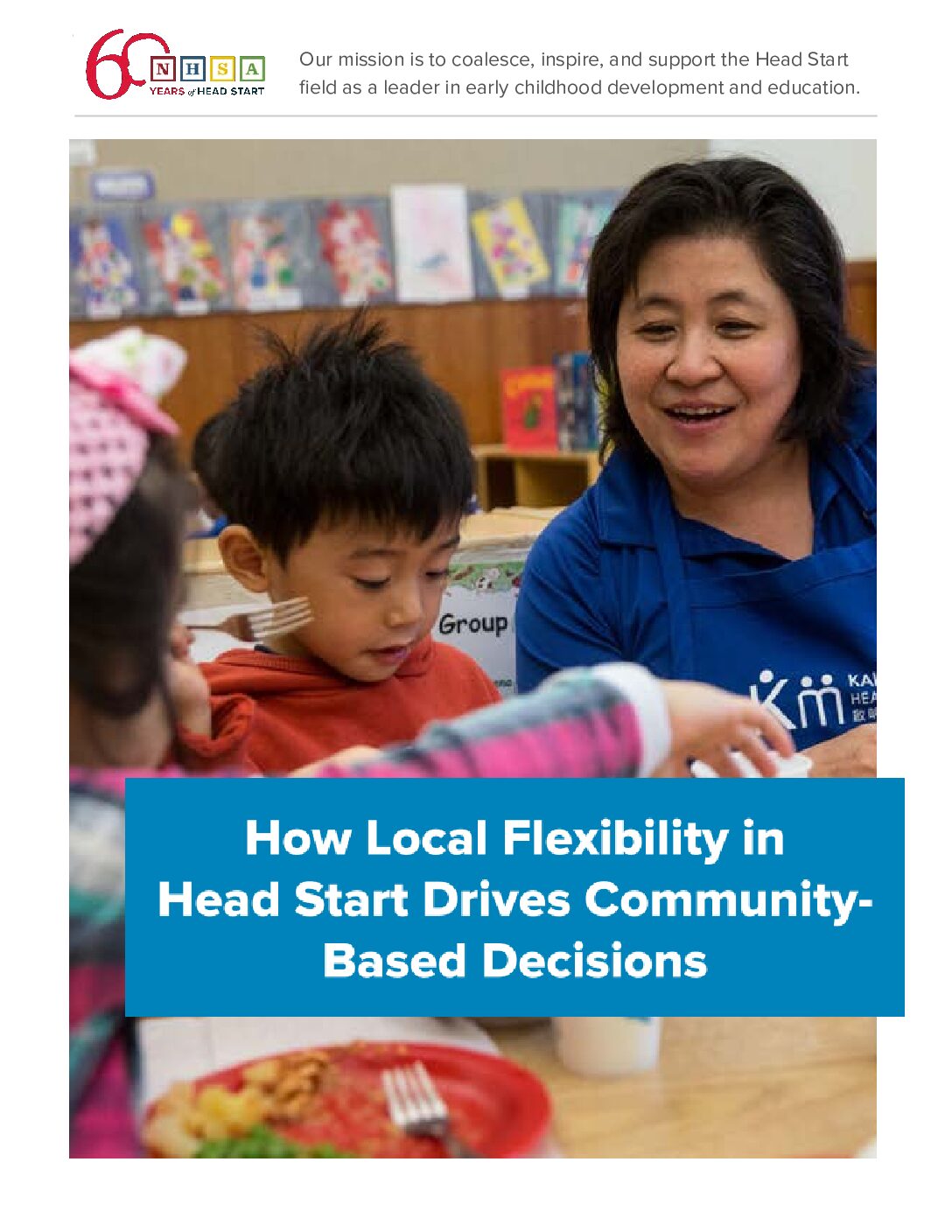There is no singular look to Head Start – its federal-to-local structure has served communities and families well over the past six decades, benefiting from the ability to adapt and connect to the unique priorities of individual communities. National standards ensure a baseline of quality. In addition, Head Start programs demonstrate a rich breadth and depth of services across locations — reflecting the spirit, priorities, and cultures of local communities and the parents who help lead each program. The following examples, a small selection from a broader national compendium, illustrate some of the myriad ways that Head Start is adaptable, flexible, and provides communities with the ability to best meet the needs and preferences of local families and children.
Head Start programs create engaging environments to encourage children’s natural curiosity and exploration and foster a love of learning. Through quality teacher-child interactions, strong developmental standards, and locally chosen curricula, Head Start ensures all children are ready for kindergarten.
Since its inception in 2012, the highly popular Mandarin program at Albina Head Start in Oregon has expanded from three classrooms to 17. Daily Mandarin instruction incorporates methods like singing, dancing, movement, art activities, and games. This approach allows children to learn another language while having fun.
In Ohio, the Aullwood Audubon Center and Farm partners with the Miami Valley Child Development Centers to operate a Head Start classroom on a working farm. The program meets all Head Start standards and follows the High Scope curriculum. The children also spend extensive time outdoors on the farm every day, even doing farm chores.
Head Start ensures that geography or unique circumstances are not obstacles to getting a strong start in life. Whether located at the bottom of the Grand Canyon for remote families or on military installations for active service families, Head Start is there.
The Rural Alaska Community Action Program provides home-based Early Head Start services to meet the needs of eight remote Alaska Native communities that engage in subsistence activities, including moving to itinerant fish camps during the summer months.
The Fort Carson Head Start Center, located on the Fort Carson (Colorado) army base, serves more than 100 children, more than 80% of whom have a parent serving in the military. The program is especially equipped to address separation issues that come with parental deployment.
Head Start addresses critical health and nutrition needs so that children are fully ready to learn and grow. It ensures children who otherwise may be experiencing food insecurity are provided with nutritious meals and snacks, often including months when the program is closed. And Head Start brings health services where they are needed most – directly to children while at school or to them and their families through mobile health units and local community health and dental clinics.
Through on-site food pantries with local fresh vegetables and dairy, gardens in the outdoor space, hydroponic plant towers, and a from-scratch kitchen, Colorado’s Clayton Early Learning provides children and parents with nutritious food options for their families.
The Anoka/Washington County Head Start in Minnesota partners with two local dental clinics to provide on-site dental services for their children and families. This has made it possible to avoid long waiting lists and get necessary dental care much sooner than would be the case in the community at large.
Head Start meets children’s early intervention needs more readily than most other community options.
Recognizing the gap in services for children with low vision and blindness, the Los Angeles Office of Education and the Blind Children’s Center created Early Head Start mainstream classrooms that specialize in supporting children with visual impairments. They also help parents and caregivers learn the specialized skills needed to support their vision-impaired child’s growth.
In 2020, Indiana’s Community Schools Head Start took a creative approach to addressing their children’s anxiety and mental health challenges caused by the pandemic: a therapy dog. Westin, the therapy dog, helps children regulate their emotions, cope with separation anxiety from their parents, practice patience, and much more.
Head Start provides a two-generation approach to lift families out of poverty, recognizing that empowering parents helps strengthen families. Through Head Start, parents and caregivers are supported in their efforts to enroll in work and adult education programs, connect to community resources, and engage in parenting activities that emphasize their role as their children’s first teacher.
At the Genesis Center in Rhode Island, parents and children learn together. Through the Children’s Friend Early Head Start-Child Care Partnership, parents attend adult education classes while children participate in Head Start. Parents are supported on their path to financial security through adult education classes, career support, bus vouchers, tax assistance, and a special savings-match program through the Bank of Newport.
The Economic Security Corporation Head Start in Missouri works with a local bank to build parents’ financial literacy and credit scores. Parents and caregivers learn about savings and checking accounts, how to build credit, and other vital financial skills.
Strong community partnerships help stretch limited federal dollars. For example, Head Start expands parent choice with local partnerships that extend care for parents who are working or in school, or have transportation needs.
San Diego’s Metropolitan Area Advisory Committee Child Development Program maximizes Head Start and state funding to provide both center-based and home-based options for families. Family child care homes may utilize and adjust or renovate existing space in a home to provide programming that meets Head Start quality standards.
Parents and Children Together Head Start in Honolulu’s Kahauiki Village is located in an affordable housing community for families who were formerly homeless. Built through a private/public partnership in response to Hawaii’s growing unhoused population, Kahauiki Village offers Head Start services augmented with additional early childhood funds to run 10 hours a day throughout the year, enabling parents to work or complete their education.

